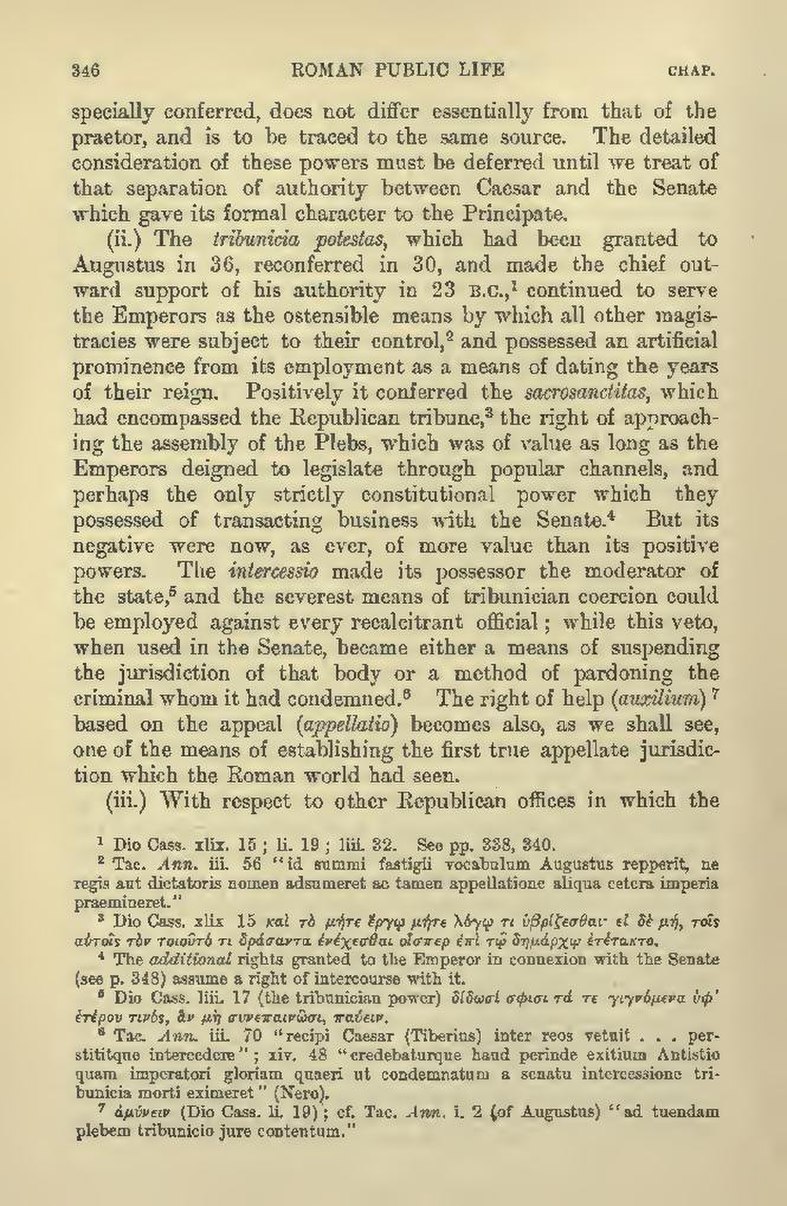specially conferred, does not differ essentially from that of the praetor, and is to be traced to the same source. The detailed consideration of these powers must be deferred until we treat of that separation of authority between Caesar and the Senate which gave its formal character to the Principate.
(ii.) The tribunicia potestas, which had been granted to Augustus in 36, reconferred in 30, and made the chief outward support of his authority in 23 B.C.,[1] continued to serve the Emperors as the ostensible means by which all other magistracies were subject to their control,[2] and possessed an artificial prominence from its employment as a means of dating the years of their reign. Positively it conferred the sacrosanctitas, which had encompassed the Republican tribune,[3] the right of approaching the assembly of the Plebs, which was of value as long as the Emperors deigned to legislate through popular channels, and perhaps the only strictly constitutional power which they possessed of transacting business with the Senate.[4] But its negative were now, as ever, of more value than its positive powers. The intercessio made its possessor the moderator of the state,[5] and the severest means of tribunician coercion could be employed against every recalcitrant official; while this veto, when used in the Senate, became either a means of suspending the jurisdiction of that body or a method of pardoning the criminal whom it had condemned.[6] The right of help (auxilium)[7] based on the appeal (appellatio) becomes also, as we shall see, one of the means of establishing the first true appellate jurisdiction which the Roman world had seen.
(iii.) With respect to other Republican offices in which the.].](Dio Cass. li. 19); cf. Tac. Ann. i. 2 (of Augustus) "ad tuendam plebem tribunicio jure contentum."]
- ↑ Dio Cass. xlix. 15; li. 19; liii. 32. See pp. 338, 340.
- ↑ Tac. Ann. iii. 56 "id summi fastigii vocabulum Augustas repperit, ne regis aut dictatoris nomen adsumeret ac tamen appellatione aliqua cetera imperia praemineret."
- ↑ Dio Cass. xlix 15 [Greek: kai to mete ergô mete logô ti hybrizesthai; ei de me, tois autois ton toiouto ti drasanta enechesthai oisper epi tô demarchô etetakto
- ↑ The additional rights granted to the Emperor in connexion with the Senate (see p. 348) assume a right of intercourse with it.
- ↑ Dio Cass. liii. 17 (the tribunician power) [Greek: didôsi sphisi ta te gignomena hyph' heterou tinos, an me synepainôsi, pauein
- ↑ Tac. Ann. iii. 70 "recipi Caesar (Tiberius) inter reos vetuit . . . perstititque intercedere"; xiv. 48 "credebaturque haud perinde exitium Antistio quam imperatori gloriam quaeri ut condemnatum a senatu intercessione tribunicia morti eximeret" (Nero).
- ↑ [Greek: amynein
